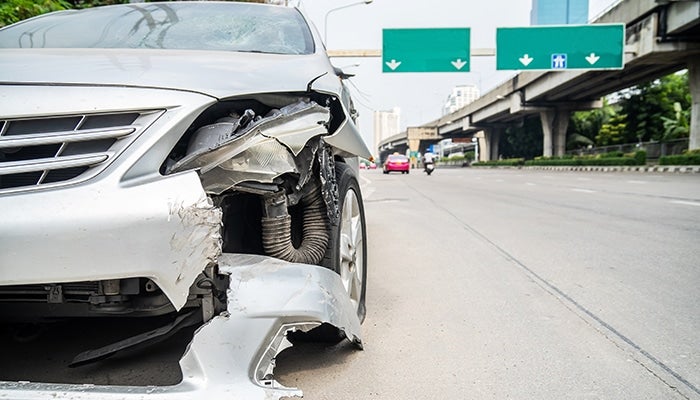Affiliate Disclosure: Automoblog and its partners may earn a commission if you purchase a plan from the car insurance providers outlined here. These commissions come to us at no additional cost to you. Our research team has carefully vetted dozens of car insurance providers. See our Privacy Policy to learn more.
If you want to be fully protected every time you get behind the wheel, full coverage auto insurance can be a good idea. Technically, there’s no insurance policy that covers everything, but this type of coverage comes close.
Although it’s often marketed as one policy, full coverage auto insurance is actually a combination of liability, collision and comprehensive coverage. As you might expect, since full coverage insurance protects you in more situations, it also costs more than basic car insurance. But for many drivers, the extra peace of mind is worth every penny.
To see how much a full coverage policy would cost you, get free quotes from the best car insurance companies in your area using the tool above.
What is Full Coverage Auto Insurance?
Full coverage auto insurance is a term used to refer to a common bundle of three different car insurance policies, all designed to protect you after unforeseen circumstances. Liability, collision and comprehensive together make up full coverage car insurance.
Here’s a breakdown of what each level of coverage pays for:
- Liability insurance: This insurance covers medical bills and the repair costs of damage to other people’s property and vehicles as a result of a collision you’re found at fault for. Most states require this coverage.
- Collision insurance: This insures your own car against damage from a collision you cause with another car or inanimate object, like a telephone pole or tree. While typically optional, some car loans and leases require you to have this coverage while your vehicle is being financed.
- Comprehensive insurance: This covers the cost of repairing your vehicle in situations other than collisions, such as theft, vandalism or hitting an animal. Like collision coverage, this coverage is optional, but some car loans and leases might require it.
How Much Does Full Coverage Auto Insurance Cost?
According to the most recent report by the National Association of Insurance Commissioners (NAIC), the average total cost of full coverage auto insurance in 2018 was $1,056.55. For liability-only coverage, drivers paid an average of $644.11, and to add collision and comprehensive coverage, it cost $377.62 and $167.91 on average, respectively.
These averages may vary significantly from what you pay, as insurance costs are highly personalized. Your own car insurance rates will depend on a number of factors, including:
- Your age
- Your gender
- Your marital status
- Where you live
- How long you’ve been driving
- Your driving record, including any accidents or moving violations
If there’s more than one driver in a household, insurers will determine who is most likely to use the vehicle as the basis for any premiums, as well as how far it will be driven and how it will be used.
How much you’ll pay for full coverage auto insurance may also depend on a credit-based insurance score, which is a unique calculation made by insurers to determine how likely you are to file a claim. California, Georgia, Hawaii, Massachusetts, Oregon and Utah are among the states that either prohibit or restrict credit-based insurance scores, so it may not be a factor depending on where you live.
Another factor that will affect your premium cost is the type of vehicle you drive. Drivers of sports cars are more likely to speed than drivers of minivans, and the premiums charged reflect that. The same applies to luxury cars and their many computer systems, which cost more to repair than mainstream cars. Rates are also typically higher for cars with features such as all-wheel drive transmissions and hybrid engines, as repairs to these parts can be more costly.
Finally, how much coverage you purchase affects your price. Choose a full coverage auto insurance policy with high coverage limits and/or low deductibles, and you can expect to pony up more.
What is Minimum Coverage?
Each state requires a minimum amount of auto insurance coverage for bodily injury and property damage. To see your state’s requirements, check your transportation department’s website or refer to this handy chart.
While opting for minimum coverage over full coverage auto insurance may seem like an ideal way to save money, other parties involved in an accident can sue you for additional costs not covered by your insurance policy. Beyond the extra funds being sought, you may end up having to pay for a lawyer, court costs and additional funds as determined in court – or in a negotiated settlement.
For example, if you live in Alabama, your minimum required liability coverage limits are 25/50/25, which means your policy will cover $25,000 in bodily injury per person, $50,000 in bodily injury per accident and $25,000 in property damage per accident. However, if you cause a car accident and damages amount to $40,000, you’ll be on the hook for the remaining $15,000 after your insurance company pays out.
Opting for minimum coverage is penny-wise but pound-foolish.
Other Types of Car Insurance
Minimum coverage and full coverage auto insurance aren’t the only types of policies available. Depending on whether your state has a no-fault insurance system or a traditional tort insurance system, other policies you may need or may want to add include:
- Underinsured/uninsured motorist coverage: As its name implies, this policy pays for property repairs and injuries to you and your passengers if you’re hit by a driver who doesn’t have enough coverage or doesn’t have insurance at all. Uninsured motorist coverage is required in seven states and Washington, D.C.
- Medical payments (MedPay): This coverage is most common in states with traditional tort insurance systems. It covers the cost of medical expenses for you and passengers after an accident.
- Personal injury protection (PIP): In no-fault states, no matter who is at fault, injury costs are paid by each person’s personal injury protection coverage up to certain limits. Above that, costs may be paid by the at-fault driver’s bodily injury liability policy.
- Rental reimbursement: This optional policy add-on pays for a rental car while your own vehicle is being repaired, up to a certain daily rate and up to a specified number of days. Some insurers include this as part of their full coverage auto insurance policies.
- Roadside assistance: This add-on covers the cost of towing should your car become disabled. It may also be included in full coverage car insurance.
- Guaranteed asset protection (GAP) coverage: Usually required by lenders, GAP insurance helps you pay off your car loan or lease should you owe more than the car is worth after an accident, regardless of who is at fault.
- New car replacement insurance: This can typically be purchased alongside full coverage auto insurance. If your car is totaled, this coverage pays for a new vehicle of the same make and model as your old car, minus your deductible.
Our Recommendations for Full Coverage Auto Insurance
Now that you’re familiar with what you’re facing, it’s time to choose an insurance company.
Before you decide on an insurer, check to make sure the company you’re considering is licensed in your state by checking your state’s insurance division website. You might also want to check the company’s financial stability, since this affects the ability to pay out claims.
To help point you in the right direction, we’ve highlighted a few of our highly recommended insurers below. We chose these companies based on reputation, availability, coverage, cost and discounts, and customer experience, and they’re names you’ll recognize.
As mentioned, prices can vary depending on a number of factors, but these companies provide some of the best value. To start getting free car insurance quotes from top providers in your area, enter your ZIP code below.
GEICO: Best Overall
More than merely a producer of memorable advertising, GEICO tops our rankings in every category, earning a score of 9.8 out of 10.0 for industry reputation, an 8.5 for coverage, a 9.4 for cost, and a 9.0 for customer experience. In addition to low prices, the company offers a wide range of discounts on full coverage auto insurance and other policies. Plus, GEICO has earned an A++ rating for financial strength from AM Best.

USAA: Best Military Provider
If you’re in the military, odds are you’re covered by USAA, which is reserved for military members and their families. We rate the company an 9.6 out of 10.0 overall, giving it an 9.5 for coverage, a 9.3 for its industry reputation, a 10.0 for cost, and a 9.3 for customer experience. Like GEICO, USAA holds an A++ rating from AM Best, so you can feel confident in its ability to pay out claims.

Progressive: Best for High-Risk Drivers
Since 1956, Progressive has specialized in covering high-risk drivers, which is unusual among larger insurance companies. Now America’s third-largest insurer, it offers coverage on anything motorized, including full coverage auto insurance. We rate Progressive 9.1 out of 10.0 stars, giving it a 9.1 for reputation, 9.0 for coverage, 9.3 for cost, and 8.9 for customer experience. You can learn more in our Progressive insurance review.



